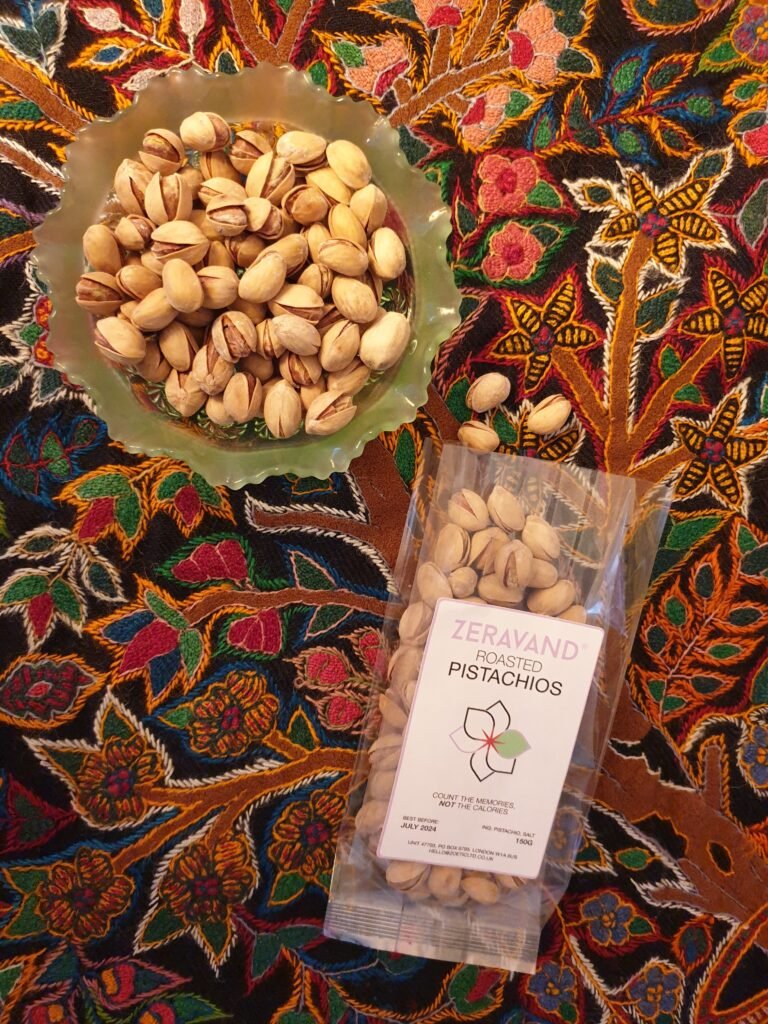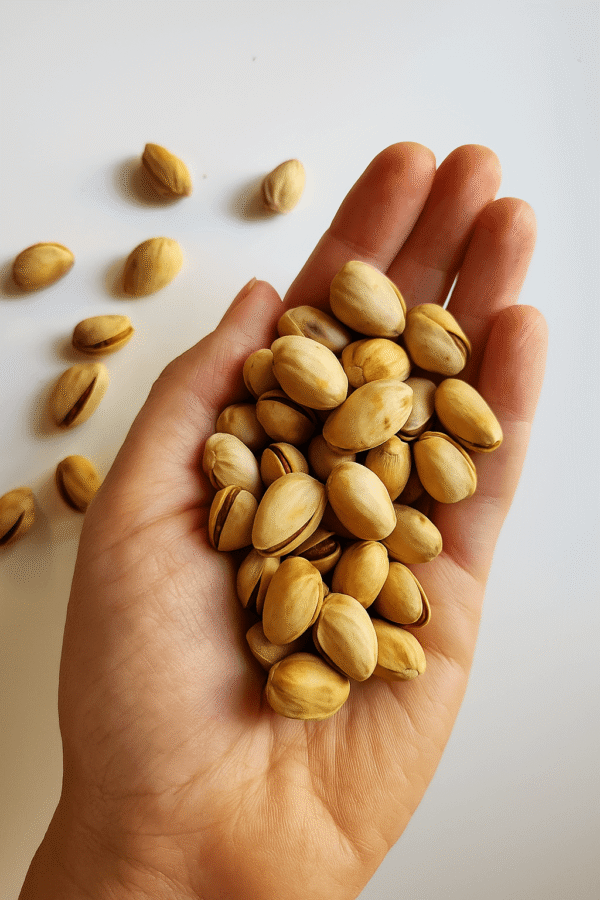“Eat a handful of pistachios a day and your heart might thank you for it.” That’s what one recent review from Nutrients journal suggested, after linking these bright green powerhouses to better cholesterol, blood sugar and even gut health. not bad for a nut that fits in your palm. So are pistachios good for you? Yes, and more than you probably think.

You don’t have to become a nutrition nerd to appreciate why pistachio deserves a spot in your daily routine. Pistachios are one of the few nuts that naturally contain a rich combo of plant protein, fiber and healthy fats, the trio your body uses to stay energised, balance, and satisfied. Compared to almonds or walnuts, pistachios come with unique perks: they’ve got more potassium than most, are naturally lower in calories per gram, and are surprisingly high in antioxidants, rivaling even some berries.
Yes. Pistachios contain two carotenoids (lutein and zeaxanthin) that support eye health and may help protect against age related decline in vision. That’s something you usually hear about carrots or leafy greens, not snack food.
But pistachios don’t stop there. They are also rich in vitamin B6 (which support your immune system to hormone balance), thiamine, copper and manganese (essential minerals that many of us don’t get enough of). Each of these plays a specific role in how your body runs. Think of them like tiny maintenance workers inside you, keeping systems smooth, resilient, and firing efficiently.
Here’s something else that might surprise you: pistachios are considered a complete protein. That means they contain all nine essential amino acids your body needs to build and repair muscles. This is essentially rare for plant-based sources. For vegetarians, vegans, or anyone trying to cut back on meat, that’s a big deal.
In fact just 30g-40g pistachios counts as one serving, and that portion contains 160 calories, 6 grams of protein and 3 grams of fiber. That’s a snack that doesn’t just fill a gap. It works for you.
Still wondering if they are too fatty? Good question. Pistachios are high in fat, but most of that fat is monounsaturated and polyunsaturated, the kind your heart appreciates. These fats can help lower LDL (bad) cholesterol while supporting HDL (good) cholesterol levels. You can learn a bit more about good and bad fats on this NHS link.
Pistachios also come packaged with fiber and protein, they don’t spike your blood sugar the way processed snacks do. That means steadier energy, fewer crashes, and better appetite control.
There’s even evidence that pistachios may help with weight management. A 2023 study in printed in National Library on Medicine (NLM) found that nut-eaters (pistachio fans included) tended to have better overall diet quality and were less likely to gain weight over time, despite their higher calorie density. It’s not magic, it’s just smarter snacking.
If you’re the kind of person who likes to prep for long days or needs a reliable office drawer snack, a small jar of pistachios might be the easiest health upgrade you make this week.
And here’s a bonus: they’re also environmentally friendly, compared to other tree nuts. Pistachio trees are fairly drought-resistance and require less water than almonds. This is why pistachio nuts thrive in a semi-arid climate like central Iran and New Mexico USA making them a more sustainable choice for the climate-conscious eater.


In the section below, we’ll break down the top health benefits of pistachios, from heart and gut health to skin, immunity and even mood. So you can see exactly why this snack punches above weight,
Pistachios are tiny, but their heart-healthy credentials are massive.
Regularly eating pistachios has been linked with lower total and LDL cholesterol levels. One study published in the American Journal of Clinical Nutrition showed that adults who ate pistachios as a part of a balanced diet had better lipid profiles than those who didn’t. Translation? Your arteries stay clearer, your heart works easier.
How to use it: Swap a handful of pistachios for processed snacks like crackers or crisps. Or add chopped pistachios to your morning oats with a drizzle of honey for a heart-smart breakfast.
Here’s something counterintuitive, eating fat doesn’t necessarily make you gain weight. In fact, pistachios might help you with the opposite.
Thanks to their trio of protein, fiber and healthy fats, pistachios are digested slowly, meaning they don’t cause a spike in blood sugar like carb-heavy snacks. That makes them a smart choice for people with insulin sensitive or type 2 diabetes.
What about weight? Multiple studies show that people who eat nuts regularly (pistachios included) are less likely to gain weight over time. The high satiety factor of pistachios may reduce overall calorie intake during the day.
How to use: Keep a 30g portion in your bag or desk drawer for a satisfying afternoon snack that won’t wreck your energy later.
Think antioxidants only come from blueberries or green tea? Think again. Pistachios are one of the most antioxidant-rich nuts around. In fact, they rank just behind walnuts and pecans. They’re specially high in lutein and zeaxanthin, two carotenoids crucial for eye health and protection from blue light and oxidative damage.
They also contain polyphenols and tocopherols, both of which are linked to reduce inflammation and protection against certain chronic diseases.
How to use: Eat them raw or dry-roasted for the best antioxidant value. Skip heavily salted or sugar-coated versions, those can cancel out the health benefits.
Fiber isn’t just about “keeping things regular.” It’s the food your gut microbiome thrives on. And pistachios deliver.
A single serving provides about 3g of fiber, which can help improve digestion and support healthy gut bacteria. But more interesting, pistachios act like a prebiotic, meaning they feed beneficial bacteria like Lactobacillus abd Bifidobacterium.
In one study published in The Journal of Nutrition, participants who ate pistachios daily had significantly increased levels of butyrate-producing bacteria in their gut. Why does that matter? Butyrate is a short-chain fatty acid that fuels gut lining cells and helps reduce inflammation throughout the body.
How to use: Add crushed pistachios to salads, grain bowls or yogurt parfaits. The fiber will help keep your gut humming, and the flavour adds crunch and depth.
Few plant foods are considered “complete proteins.” Pistachios are one of them.
They contain all nine essential amino acids, which makes them an ideal option for vegetarians, vegan, or anyone dialing back on animal products. Plus, they provide 6g of protein per serving, which is more than most other nuts.
But it’s not just about muscle repair. Amino acid from protein are also essential for producing neurotransmitters like serotonin and dopamine. Meaning your mood, sleep, and focus may benefit too.
Add to that the B vitamins (especially B6, which helps create brain chemicals and supports red blood cell function), and pistachios become a brain-and-body booster in one tidy package.
How to use: Blend pistachios into smoothies or use them in homemade energy bites with dates and oats for a post-workout snack that ticks all the boxes.
To sum it up, pistachios are more than just a pretty green garnish. The’re functional, flavourful, and flexible enough to fit into almost any eating, from Mediterranean to low-carb, from plant-based to high protein. And they’ve got the nutritional credentials to match.
